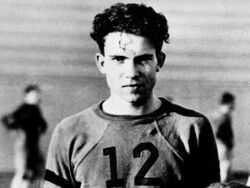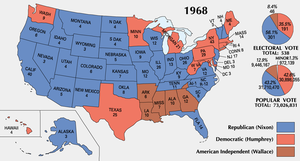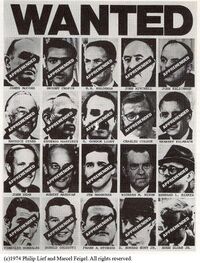Richard Nixon
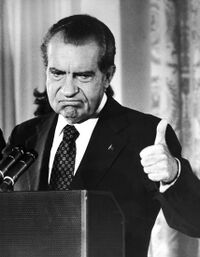 | |
| Born | Richard Milhous Nixon January 9, 1913 Yorba Linda, California, United States |
| Died | April 22, 1994 Manhattan, New York, United States |
| Nationality | American |
| Alma mater | Duke University |
| Occupation | 37th President of the United States |
| Term | January 20, 1969 – He just felt like quitting, Goddammit |
| Predecessor | Another guy with a word for penis in his name |
| Successor | A Homer Simpson look-alike |
| Political party | Republican Party |
| Religion | Himself |
| Spouse | Mostly resentful (1940–93) |
| Children | Tricia Julie A really big box of tapes |
| Signature | |
“A man is not finished when he is defeated. He is finished when he quits.”
Richard Milhous Nixon (January 9, 1913 – April 22, 1994) was an American home stereo-recording enthusiast, known bulk buyer of balaclavas, noted expert on Washington-area hotels, and the 37th President of the United States to be frequently referred to as a "Dick".
Nixon rose to political prominence following his election as a Californian member for the House of Representatives, fully embracing all he'd learned from the state that gave the world Hollywood — namely the hubris, contempt for the law of the land, an aptitude for issuing the least sincere of apologies, and a pathological desire to force fuzzy little animals into any piece of media he released.[1] With his expansion of American intervention in Vietnam, Nixon even provided a second exotic location full of loose women where a man could chase glory, blow all his hopes and dreams and wind up as a chronic alcoholic in downtown Los Angeles.
Nixon's presidential legacy also included opening United States government relations with Communist China, with Elvis Presley, and with the creaking rear window of the 1972 Democratic National Headquarters. The last of these three would lead to his being the first President of the United States to resign from office, after a Senate investigation revealed he had used the resources of the FBI for his personal gain, set the IRS tax men on his opponents, and committed several other shocking and degenerate abuses of power the average man would do within 5 minutes of being elected President.
Curiously, the one thing Nixon failed to learn from his California upbringing was the ability to act for the American audience. Nixon is remembered for his amoral, sociopathic, and jowl-wobbling tendencies, as well as sullying the office of the presidency, which says more about how well the previous 36 presidents had disguised their amoral, sociopathic, and jowl wobbling tendencies than anything else.
Early life
On a bright January day in 1913, a bouncing baby boy was welcomed as a fine addition to a farming family in Yorba Lindy, California. This family obviously wasn't the Nixon family, who, as devout Quakers, would have much preferred the addition of a milquetoast 63-year-old accountant from Nebraska.
Nixon's parents were early adopters of the 'child abuse' school of Christianity, barring a young Richard from dancing, drinking and swearing, because everyone knows that would create an adult the whole world would forever respect as a pillar of integrity. Nixon obeyed his parents and instead indulged in creating clandestine stereo equipment to secretly listen to other children dancing, drinking and swearing.
At age 10, Richard suffered from one of those diseases the anti-vaccine campaigners are desperately trying to bring back, and was also banned from playing sport. You know, because there was literally nothing inappropriate a boy could get up to with no hobbies, a great deal of free time and an ample supply of different shaped vegetables.
As a teenager, Richard was offered a job in the diner of his parents' new gas station, to which he defiantly responded, "I am not a cook." He instead opted to help courier the family's fresh produce to the farmers markets of Los Angeles. Nixon's interactions with the condescending yuppies and bragging students who typically patronize a local produce market are thought to have driven his lifelong distaste for leftist politics, culminating in his 1970 order to deploy the National Guard to Kent State University when he heard they were opening an organic salad bar.
Education
As an insecure and sickly youth banned from the athletics program by a mother who despised fun, Nixon was obviously a popular figure during his school years. No really, he was elected president of the 8th grade class and there was not a single report of a break-in at the homes of his pubescent political opponents. Nixon scored good grades through his time at the most forgiving high school in the universe and earned consideration by a number of reputable colleges, which he sadly blew by going to Duke University instead.
Early career and service
Nixon returned to California fresh with a law degree from Duke and was admitted to the bar in 1937, ordering beers until his mother found out and dragged him off the premises by the ear. Soon after he began practicing law at the firm Silly-name & Innuendo, working on commercial litigation for petroleum companies and other clients reputed for their upstanding morality.
As this was a mythical era when professional workers actually had free time, Nixon took part in a community play where he met high school teacher Thelma "Pat" Ryan, with whom he initiated courtship. As would become a common theme in Nixon's life, it took several attempts and the possible shooting in the head of a rival or two before he secured the seat he wanted. In this case the seat was next to a slightly uneasy Ryan and in front of a cut-price wedding photographer.
Nixon was initially excluded from military service in World War II for having a devoutly religious upbringing that caused such resentment for the world it would make him irreplaceable in government service. However, in 1942 Nixon bravely volunteered for deployment in the Pacific theater and saw such horrible places as Bataan, Guadalcanal, Iwo Jima... on the top of reports ordering radio cables of various length and thickness.
Politics
Nixon soon adopted the favorite hobby of middle America during the immediate post-war era: accusing people of being Communists. As his mother had forbidden all his previous hobbies, Nixon went a little overboard with this, buying all the microphones and damaging fliers he could with the Christmas money mother sent each year. In 1946 he managed to turn the hobby into a fledgling career by soiling the name of Democratic Congressman Jerry Voorhis of California's 12th District, thereby elevating himself to a seat at the clubhouse of people who like the sound of their voice a little too much, otherwise known as Congress.
Nixon set his sights even higher, directing his attention toward lawyer, government official, and winner of the most reptilian name in the nation, Alger Hiss. This time Nixon's bloodhound-like nose (whole face really) had really sniffed out a winner as Hiss was found to have been involved in espionage, and Nixon earned much respect and an invitation to some mutually assured seduction with an overstimulated Senator Joseph McCarthy.
Vice Presidency
General Eisenhower was nominated for president by the Republicans in 1952, and party officials recommended Nixon to the general on the basis that placing a no-nonsense, bald military higher-up alongside a guy with a big nose who tried basically everything to get out of combat was absolutely hilarious.[2] The campaign also hammered out a catchy slogan for the pair, with "I like Ike" and "I'm slightly curious about Dick, but just don't go telling my friends now".
However, in a completely unforeseeable set of events, Nixon — the man who had been parading around accusing people of hiding dirt — was actually hiding some dirt himself, with the help of his little dog, too.
Even back when television sets were black & white and left you sterile, wealthy benefactors wanted politicians to spread their message to a pliable audience. Unfortunately, their budgets were limited and could only be used for political necessities like stationery, travel costs, hookers and hooker scandals. Not that Nixon did anything actually illegal, but the American public generally doesn't like the idea of people being given things for free unless they're related to someone.
To prove his purity of heart, Nixon used the dirty filthy money to buy a desk, some chairs and a TV programming block in September and prepared to speak his heart out:
- My fellow Americans, I come before you tonight as a candidate for the Vice Presidency, and as a man whose honesty and integrity have been questioned...
The public was apprehensive at the possibility of seeing a grown man cry and/or get naked, but thankfully Nixon deployed his secret weapon:
- A man down in Texas heard Pat on the radio mention the fact that our two youngsters would like to have a dog. And, believe it or not, the day before we left on this campaign trip we got a message... saying they had a package for us. We went down to get it. You know what it was?
- CHECKERS THE PUPPY PUPPYPUPPYPUPPY AGODDAMNPUPPY LOOKATTHEPUPPY PUPPYHERE PUPPYTHERE PUPPYINTHEAIR
The political establishment took Nixon's speech as a fine explanation for where $18,000 ($230,000 in mildly disappointing modern dollars) of the fund had gone, leaving most casual observers to ask "How bloody much was that doggy in the window?"
In office
Nixon was successfully elected in 1952 and again in 1956, achieving absolutely nothing during his tenure, as a good Vice President should.
1960 Presidential campaign
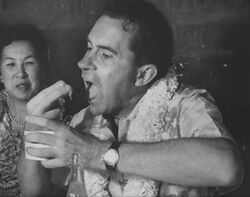
In 1960, Nixon launched his first campaign for President of the United States on a platform of continuity, experience, and Nixon's now-first-rate CPR technique, derived from his attempts to keep Eisenhower alive the full two terms. He faced little opposition in the Republican primaries and chose a secluded 42-room luxury Massachusetts Lodge as his running mate, to appeal to the wealthy jet-setting crypto-Satanists of the party.
Unfortunately for Nixon, a handsome All-American war-hero lady-killer emerged from the turbulent political seas on daddy's 120ft yacht to spoil the party, probably with alcohol or something. John F. Kennedy was everything Nixon wasn't, down to having a mother who probably gave him gifts rather than taking them away and then staging an exorcism.
Kennedy's slogan, "Get America Moving Again", seemingly invited the nation to come to the senior dance and snuggle their face into his broad shoulders. Nixon only had 8 long years of economic prosperity under his belt, and was all too ready to get that out and show it off.
Kennedy claimed the previous administration had allowed the USSR to overtake the United States in ballistic missiles, which he called the missile gap while making suggestive gestures to describe other kinds of more feminine gaps. Kennedy's suavity was suited to the TV medium, and when he spoke at the four televised debates about fixing the gap everyone at home high-fived and chuckled; when Nixon spoke about fixing the gap everyone just got a rapey vibe.
Nixon's vibe was apparently a winner for a disturbingly large and disturbingly disturbing portion of America, but he still lost.
1962 California gubernatorial election
But that loss didn't matter, because Nixon decided he actually wanted to be Governor of California now. Nixon launched his campaign on a platform of no continuity, a lack of experience and Nixon's now first-rate CPR technique, derived from his attempts to keep his career alive. He faced little opposition in the Republican primaries and chose a— oh there's no such thing as Vice Governors.
Unfortunately for Nixon, a pretty average middle aged man emerged from the placid bay-area waters on a 12ft tin boat to spoil the party, probably with reduced alcohol beer or something. Pat Brown was actually pretty much everything Nixon was, except he was also Governor of California now because Nixon totally lost again.
Following the loss, an irate Nixon promised the media this would be his "last press conference," proving once again Nixon's reputation for being honest.
Presidency
After 1962, Nixon had taken a six-year hiatus from politics and completed a sojourn across the country to point and glare at everyone who he had felt wronged him. When he returned, he found the the world went and got itself in a big damn hurry; President Kennedy departed politics in the rear of the presidential limo, and Lyndon B. Johnson entered the presidency in the front of the presidential aircraft. Then after entering Vietnam on the backs of tens of thousands of American soldiers, President Johnson felt like leaving at the back end of only one term.
The Republicans smelt blood in the water, and the 1968 Presidential primary turned out the who's who of past and future right-wing royalty; George Romney, whose legacy might be familiar to 47% of the population; Nelson Rockefeller, whose surname built half of New York and most of Tina Fey's career; and new California Governor Ronald Reagan, who was then most famous for his work with dim-witted apes and other members of the National Rifle Association. Nixon was chucked an invite in the interests of staging an invasive and degrading "Where are they now?" segment if the Republican Convention ran under time.
Republican enthusiasm for Nixon increased markedly when it was revealed he was the only one of the four to have earned money from running his political career, and it reached fever pitch when Nixon chose Spiro Agnew, a Maryland Governor who had definitely earned money during his political career, as running mate. Nixon's dedication to a "silent majority" was what guaranteed his nomination, as Republicans simply can't abide by someone who who thinks about minorities.
Unfortunately for Nixon, a handsome All-American war-hero lady-killer emerged from the turbulent political seas on daddy's 120ft yacht to spoil the party once again. Fortunately, a man from another culture with an aversion to alcohol took exception to Robert F. Kennedy, and this Kennedy departed politics much the same way as his brother.
The best candidate the Democrats could field in the interim was Hubert Humphrey, a man who had nothing but alliteration going for him — at least until talk of a peace deal in Vietnam. Thankfully the participants at the talks came to their senses and rejected that sickening idea of harmony and coexistence, securing Nixon's victory.
Soviet Union and China
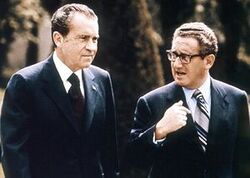
The idea of harmony and coexistence became a little less sickening when Nixon realized he had to deal with the Soviets and their nuclear arsenal, which was even more of an 'oh shit' moment for someone who built most of his early career around shouting at Communists. Thankfully the Soviets were conducive to talks and to illustrate this new, un-warlike approach, a French name was chosen for the policy; Détente. Both sides had come to realize that while they held differing beliefs and cultures, underneath it all they were just human beings that wanted to be loved. The fact that the two countries were rapidly running out of money to spend on shiny new bombs was neither here nor there.
Meanwhile, the USSR and China had fallen out over whose country was the real socialist heaven of shared money and ideals. Basically, Mao missed Stalin. Their late night phone calls, the way they finished each other's sentences, their shared brutally oppressive sense of humor, all made the ongoing international communist revolution a real joy. Brezhnev could try as hard as he liked. It just wasn't the same.
Nixon wisely chose to play off this inter-communist rivalry and opened relations with Communist China in 1972; his main aim in doing so was to make Brezhnev jealous. Nixon learned he had a man after his own heart after a long conversation with Mao about the ins-and-outs of electronic surveillance. He would playfully tease Mao about his awful haircut, then Mao would make a joke about Nixon's disproportionate nose, each aware of how the elitist, probably Harvard-graduate bourgeoisie constantly wanted to tear them both down and how they both weren't in the least bit paranoid. No sir.
Vietnam
Like most modern American presidents, Nixon inherited a war fought on distant lands against true fanatical followers of a man with an affinity for facial hair. The communist Viet Cong devotees of Ho Chi Minh had already given America a solid kick in the Johnson, so a few more jabs to the Dick seemed inevitable.
SE Asia in 1968 was a place young Americans would go to be killed by locals in the jungle, vastly different from where young Americans go to be killed by locals on the roads today. The North-Vietnamese were at the throats of the South-Vietnamese, who were supported by the stateside expat-Vietnamese and opposed by the Cambodian-Vietnamese. In fact only the East-Vietnamese had stayed neutral, mostly by virtue of not existing.
With three hundred soldiers dying each week, the American public were witness to a lot of that sad death you get in films like The Deer Hunter rather than the tongue-in-cheek take on mortality you get from Coen brothers' films, and they didn't like it. Nixon therefore vowed to draw down American involvement. His approach to the conflict was one of Vietnamization, so called because it meant turning Cambodia and Laos into the same kind of fractured mess as their eastern neighbor. However the American public quickly realized Nixon wasn't drawing anything down by invading Cambodia, except maybe scribbled cock-and-balls all over international law.
The other side of Nixon's Vietnamization plan consisted of building up the strength of the South Vietnamese armed forces and re-equipping them with modern weapons, so that they could drop them and Vietnamize into the distance the second anyone looked away. This is widely considered genius in the military sphere and had been the cornerstone of American policy ever since; a portrait of Nixon overlooks the main strategy room in the Pentagon, commemorating his wisdom and his ability to make staffers feel uneasy.
Law & order
So wouldn't you know it, the moment Nixon went and spoke at a reasonable volume to some actual Communists, his beloved America of apple pie and supply side eaglenomics went and turned itself into the Paris commune, but naked-er. His first term coincided with the Summer of Love, a tumultuous period marked by everyone's grandparents toking a Central-American country's worth of drugs and having sex in an upstate New York field.
That July a few wackos even claimed to have walked on the moon.
Clearly something had to be done, and Nixon initiated the truly Sisyphean task of banning any and every substance that could alter one's state of mind. Mother would have been so proud. Only alcohol remained off limits to the War on Drugs by virtue of its tendency to eliminate use of one's mind entirely, which remained useful come election time.
The policy decimated low income minority neighborhoods. This is widely considered genius in the law enforcement sphere and has been the cornerstone of American policy ever since; a portrait of Nixon overlooks the main policy room in the Attorney General's department, commemorating his vaguely disguised racism and his ability to make staffers feel uneasy.
Economics
With those bums, hippies, and cancer patients looking for pain relief seen to, Nixon turned his attention to the other green stuff that makes people paranoid.
Nixon's administration got to work pulling the incapacitated economy out of the mud and reducing inflation and interest rates, which had gotten stupidly high like everything else. In 1971, Nixon brought down the effective gold standard that had been in operation since Bretton Woods, sparking violent protests by loners and recluses in basements across the nation.
Strangely the one addiction overlooked in the so-called Drug War was America's crippling dependence on Arab oil. Then in 1973 came the Yom Kippur War and OPEC oil embargo; Americans fronted up to their dealer for a drop of that sweet sweet crude, only to find there was not a single hit of that gear at any corner in town. Long queues of desperate people formed outside gas stations, their twitching hands offering passers-by fenced appliances and sexual favors for a fluid ounce of that good stuff. Things reached their nadir when a mob of Cadillac owners unwittingly pillaged a lacquering oil warehouse to power their rides, forcing them all to do something truly debased and buy Japanese-made replacements.
Obviously America did the smart thing, wised up to its dangerous habit and switched to renewable energy sources pretty much instantly.[3]
Reelection
Unfortunately for Nixon, a handsome All-American war-hero lady-killer emerged from the— you get the idea. But this challenger was trying to spoil the party with something even stronger than alcohol. Thankfully George McGovern was so liberal he probably would have staged a no-shower sit-in against himself had he been elected, and in 1972 Nixon won what was thought at the time to be the cleanest election campaign ever. In the history of the universe. Guaranteed.
Watergate
In fact, it was so clean that five men claiming to be janitors were caught breaking into Democratic Party headquarters at the Watergate complex in Washington five months before the election. The Washington Post was even told by a source the Nixon administration itself had sent those diligent workers to clean the offices and install new sound equipment donated by an area collector. How thoughtful.
Then a $25,000 cashier's check earmarked for the Nixon re-election campaign was found in the bank account of one of the five detained. This was when the public became suspicious, as cleaners weren't that expensive even pre-illegal Mexican immigration. However, a link to the President himself was difficult to prove because it wasn't like Nixon recorded all his conversations on eight Sony TC-800B open-reel tape recorders, did he?
Nah, actually he used nine.
Nixon initially refused to release the tapes, for three reasons:
- They were vital to national security.[4]
- Executive privilege extended to the tapes.[5]
- Did mother set you up to this? Why couldn't he just have a damn hobby, OK? And if mother asks, no he definitely wasn't singing into those tape recorders.[6]
At the end of April 1974, Nixon released edited transcripts of the White House tapes, which were about as useful as a Batman movie with all the parts about a guy who dresses up as a bat removed. In July the Supreme Court agreed that Nixon's disdain for justice was impressive even by their standards, and voted 8-0 that Nixon must turn over the unadulterated tapes; Justice William Rehnquist recused himself because he preferred Superman, anyway.
The unadulterated tape taken six days after the Watergate break-in was the one that would have made his mother cry most, second only to the tape where Nixon mulls over wearing dancing shoes to the inaugural ball. In the tape, Nixon agrees that administration officials should approach the Director of the CIA and ask him to request the Acting Director of the FBI to halt the Bureau's investigation into the Watergate break-in on the grounds that it was a national security matter, and that with titles like those they should totally be stopping warehouse cartels in speedboats or speedboat cartels in warehouses instead.
The special prosecutor felt that Nixon, in so agreeing, had entered into a criminal conspiracy whose goal was the obstruction of justice, and his audible attempts to mimic the sound of a speedboat engine when queried about his interest in the case were considered even more incriminating. There was also the question of 18 and a half minutes of static on one tape that had allegedly been tampered with, although that may just have been a brief recording of Nixon's beloved "silent majority".
Resignation
Nixon resigned the office of the presidency on August 9, 1974 with yet another public apology, except Checkers had long since upchucked his dogfood. In his resignation speech a sullen Nixon proclaimed "I am not a crook," implicating A. Crook, a milquetoast 63-year-old accountant from Nebraska, for the crimes and leaving the new president Gerald Ford no option but to pardon Nixon. Nixon then told Ford the truth about the moon landings, what really happened to Kennedy in Dallas and where Elvis had actually gone. Ford issued three more pardons, but refused to issue any more after hearing how many infants the King could eat in one sitting, with condiments.
Legacy
Nixon's resignation prompted a long period of introspection for the Republican Party. Apparently they really liked what they saw, because the next elected Republican president would repeat basically everything Nixon did, down to the criminality (see Iran-Contra). The two important additions brought to the table by Reagan were 1) a smile, as Nixon's happy face looked like one of those deep sea slime fish, and 2) unending references to Christianity, as Nixon gave the impression of someone who worships one of those deep sea slime fish.
Outside America he is remembered as a meddling imperialist who treated local cultures and governments with contempt and frequently subjected them to serious crimes, making his legacy no different to any other 20th-century politician elected to a position higher than grand poobah of his weekly men's club.
Inside America, Nixon is remembered through a number of portrayals in the popular media that are too juvenile to print here. Aroo!
Footnotes
- ↑ Checkers, a cocker-spaniel with the tired and drooping face of a political accountant setting up slush funds of questionable legality, which was quite the coincidence.
- ↑ Sadly the lovable, witty guy who fancied himself as a lady's man was a Democrat.
- ↑ Would you expect lies on an article about Nixon?
- ↑ Lie.
- ↑ Lie.
- ↑ The biggest lie of all.
| Featured version: 3 January 2015 | |
| This article has been featured on the main page. — You can vote for or nominate your favourite articles at Uncyclopedia:VFH. | |
